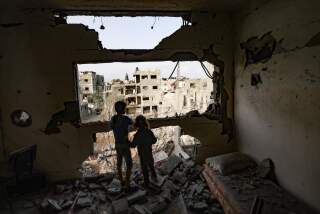War Torments Kuwait Native
- Share via
Fred Jarrar lies awake at night wondering, his imagination spinning with images of war.
Bombs and planes, guns and gas masks . . . Jarrar has visions of these things and wonders why?
Even though the Persian Gulf War is some 10,000 miles away, Jarrar, a University High School senior goalkeeper, can’t help but feel as if it is raging right beside him.
In a way, it is.
Jarrar is a native of Kuwait, having lived there until 1987, when he and his family moved to the United States. At one time, his greatest joy was playing in youth soccer tournaments throughout the Middle East. Now he worries about the welfare of relatives and friends back home.
Jarrar’s father moved the family to Orange County in hopes of expanding his export business, which at the time concentrated on trading between Kuwait and Iraq. The business is now at a standstill.
The war has directly affected many students at University High--some 180 are bused there from the El Toro Marine Corps Air Station, boys’ Athletic Director Mark Cunningham said. Many of those students have a parent involved in the crisis.
But Jarrar’s case is different. His two uncles and their families have not been heard from since Iraq’s invasion of Kuwait in August, he says, although his family has received reports that they are safe.
And while most of his American classmates see only one side of the issue, Jarrar feels for the Iraqi people too. Not everyone in Iraq, he says softly, is a Saddam Hussein. He is friends with many Iraqis, something he says some of his classmates might not understand.
“They don’t really know the inside stuff,” says Jarrar, whose real first name is Fareed. “They probably didn’t even know where Kuwait or Iraq was before the war.”
Jarrar believes more negotiation should have been tried before the fighting began, but now that the war has started, he hopes Kuwait will be liberated quickly so casualties--on both sides--will be limited.
“I have many friends who are Iraqi,” he said. “I don’t hold anything against the Iraqi people. . . . But Hussein, I don’t understand why he did that (invaded Kuwait). He’s just . . . dumb.”
Jarrar has seen a few friends who managed to flee Kuwait. They tell him of widespread looting, increased pollution and streets that have been cleared to make way for landing strips.
Since the war started, Jarrar has kept his portable radio with him at all times. In the first days of the allied attack, he even wore the headphones in class, but doesn’t know why the teachers allowed it.
Wolfgang Voight, University soccer coach, said Jarrar’s play actually improved a notch when the war started.
“We had a game at Woodbridge,” Voight said. “I knew he was aware of the war starting, because he was wearing his Walkman before the game. He was not affected. In fact, he played a very good game, like he was spurred on by it all.”
Jarrar says he doesn’t know if his soccer has been affected by the war, but admits he has had trouble concentrating on his studies. He watches all the television reports he can and reads the newspaper.
“I just try not to let it imprison me,” he said.
He said he is even somewhat amused by the intense coverage by the U.S. media. He spoke of the report of the Jan. 15 deadline on Cable News Network.
“When there was a few minutes left before the deadline, it was like it was New Year’s Eve or something,” Jarrar said. “It was like, OK, there’s 2 minutes and 19 seconds left till the war begins. . . .”
Jarrar laughs. But then his expression turns solemn again.
“I hate war,” he said. “But when your country’s gone, people want their country back. People don’t care how it’s done.”
More to Read
Sign up for Essential California
The most important California stories and recommendations in your inbox every morning.
You may occasionally receive promotional content from the Los Angeles Times.













